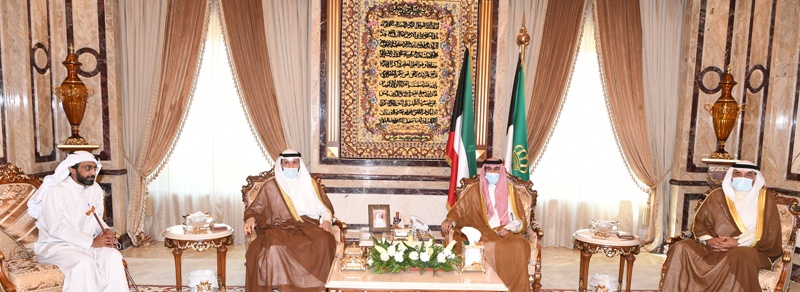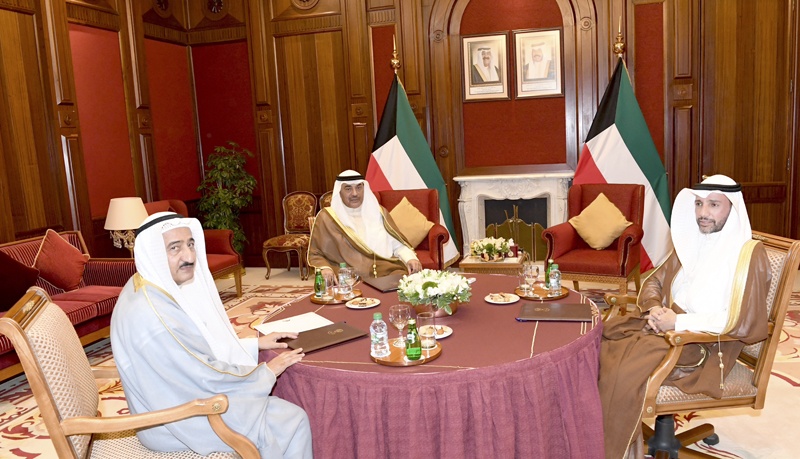By B Izzak
KUWAIT: A high-level panel appointed by HH the Amir Sheikh Nawaf Al-Ahmad Al-Sabah to set rules and conditions for an Amiri pardon held its first meeting yesterday, saying it expects to submit its first report to HH the Amir in two weeks. All three members - HH the Prime Minister Sheikh Sabah Al-Khaled Al-Sabah, Assembly Speaker Marzouq Al-Ghanem and Head of the Judicial Council Ahmad Al-Ajeel attended the meeting.
Ghanem said in a brief statement after the meeting that the "committee seeks to send its first report to the Amir within two weeks of the start of the (Assembly's) new term" tomorrow. He said the committee has prepared a work plan to complete its assignment in the shortest time possible. Ghanem said he is optimistic about the outcome of the committee's work.
The committee was formed after 40 lawmakers signed an appeal to HH the Amir to pardon political prisoners, including former MPs who have been living in exile for over three years to escape jail terms. The initiative came after days of national dialogue between the government and three leading opposition MPs, in addition to Ghanem. The prime minister took part in the dialogue.
Ghanem, Sheikh Sabah and Chairman of the Supreme Judicial Council and head of the Court of Cassation Ahmad Al-Ajeel meet at Bayan Palace yesterday upon the instructions of HH the Amir.Nine opposition lawmakers refused to sign the appeal, saying it was not shown to them beforehand, while some of them said the reason for not signing it was because opposition MP Obaid Al-Wasmi, who read the appeal, said they sought authorization from Ghanem. All the nine lawmakers however have declared their support for the pardon.
The incident created differences within opposition ranks, especially among the group of 31 opposition MPs, who traded accusations publicly. Members of the opposition exiled in Turkey meanwhile issued a statement thanking HH the Amir for his decision to pardon political activists. They also thanked the MPs who took part in the national dialogue - MPs Wasmi, Hasan Jowhar and Muhalhal Al-Mudhaf.
The statement however said they hope the pardon will be issued before the first Assembly session, which takes place two weeks after the inaugural session, which is scheduled for tomorrow. The statement was not signed by leading opposition former MP Faisal Al-Mislem, who is also in Turkey.
MP Wasmi, who came under fire by some of the nine opposition MPs who did not sign the appeal, said on Twitter that it was not acceptable that a "minority" spoils the pardon deal, a reference to the nine MPs. The differences cast doubts over the continuity of the opposition group, especially as a meeting of the group scheduled for yesterday night was called off by the organizer MP Fayez Al-Jamhour after one of his relatives passed away.
It was not immediately known if the group will meet at another venue to organize for the Assembly's opening session, especially the election of panels. But MP Jowhar, who is a leading member of the group, said yesterday he is confident the group will continue and will not collapse.
Jowhar insisted in an interview that no concessions were made during the national dialogue, especially with regards to the constitution and grillings. He expected that the government will resign after the pardon is issued, adding that the pardon is the gateway for a host of reforms and for opening a new page in Kuwait's history.
Ghanem has sent invitations to lawmakers to attend the inaugural session of the second term of the Assembly tomorrow. HH the Amir will address the Assembly, in addition to the speaker and prime minister. This will be followed by the election of around a dozen permanent committees, which will study proposals and legislation before sending them to the house for voting.
Meanwhile, the Assembly committee on stateless people or bedoons yesterday unanimously approved legislation granting thousands of bedoons basic civil rights, head of the committee MP Marzouq Al-Khalifa said. Under the bill, bedoons will be issued civil IDs granting them free education and medical care and allowing them to seek jobs like others in the country.
Around 120,000 bedoons, who have been living in Kuwait for decades, claim they are citizens and deserve to get Kuwaiti citizenship. But authorities say a majority of them or their forefathers came to Kuwait from neighboring countries and destroyed their identification documents in order to get Kuwaiti nationality.




